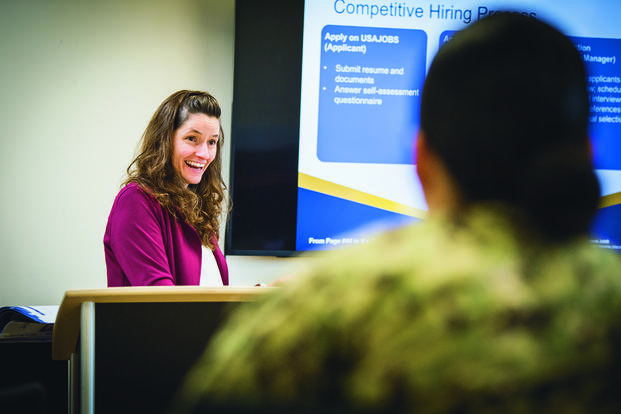Veterans who claim the Transition Assistance Program (TAP) doesn't work should read Cristin Stengel's story. Stengel, a former first lieutenant with the Air Force, had her civilian career mapped out before her transition. However, she knew that before she could take a job as a senior manufacturing engineer at Lockheed Martin, she would have to attend TAP classes.
According to Stengel, TAP was applicable to all service members of the armed forces; and her TAP instructors made sure that the attendees knew that they were starting on the same playing field in the civilian world, regardless of their rank in the service.
In the following Military.com Veterans Transition Interview, Stengel discusses her transition and how TAP prepared her for a career after the Air Force. She also imparts her wisdom on how to have a successful transition, and how veterans can make the leap from the military to the civilian world of work.
Military.com: How long have you been with Lockheed Martin?
Cristin Stengel: "I started in September 2008, so eight months."
MC: What branch of the service were you with prior to working for Lockheed Martin?
CS: "I separated from the Air Force at the end of August 2008."
MC: Where were you stationed and how long were you in the Air Force?
CS: "I was stationed at Los Angeles Air Force Base. I was on active duty for three years, and I went to the Air Force Academy for four years before that."
MC: What was your highest rank?
CS: "I was a first lieutenant when I transitioned out."
MC: Did you know what you wanted to do before your transition?
CS: "All of my education has been in aerospace engineering, so I wanted to stay in the aerospace industry and continue in that field."
MC: Did you get your degree?
CS: "I earned my bachelor's degree in astronautical engineering from the Air Force Academy, and then they sent me to grad school and I got a master's in aerospace engineering from MIT."
MC: So going to Lockheed Martin after your education was a no-brainer.
CS: "It is a good company with a good reputation. So, yeah, it was an easy decision."
MC: What about your transition out of the service? Was that easy, too?
CS: "I thought it wasn't that difficult. The Air Force did a good job of preparing us for the transition."
MC: Did you attend TAP classes, and did you find it helpful?
CS: "I found it [to be] helpful. TAP class put all officers in the same boat and made sure that the lessons were applicable to all of us. [The class] was good and got us thinking about what we wanted to do [in our civilian career]."
MC: Does Lockheed Martin offer any programs to help veterans working for them through the transition process?
CS: "Lockheed doesn't really have any programs that help with transition. They put everyone on the same playing field. However, they have a program for reservists, which is helpful, and they work with [citizen-soldiers] to keep them employed."
MC: Would you recommend Lockheed Martin as an ideal workplace to other veterans?
CS: "Definitely. The products we create are for the military, and we try to serve the people that use our products. Our company is definitely military friendly. A lot of companies reach out to veterans, and prior service is desirable to Lockheed Martin."
MC: What's the biggest challenge to transitioning service members?
CS: "I don't see anyone struggling, but I think the biggest challenge is dealing with people who take issue with the war and don't support the troops."
MC: Do you know of any veterans who have trouble finding a job?
CS: "I don't see any veterans having trouble finding employment, although I am sure that some veterans do struggle. But I think veterans should use the ties or networks [available to them]. I used a database at the Air Force Academy to reach out to other service academy graduates. Using your networks as a resource to find a job is a great tool."
MC: What are your career plans? Do you plan to serve again?
CS: "Right now, I plan to stay with Lockheed Martin. I don't have any plans to go into the Reserves. I plan to raise my kids and continue a career in the civilian world."
MC: What advice would you give other transitioning service members?
CS: "I would advise that veterans build a good resume and be confident about what they've done in the service. Service members have a lot to be proud of and a lot to offer employers. They should use their military skills to their advantage."
Find the Right Veteran Job
Whether you want to polish your resume, find veteran job fairs in your area or connect with employers looking to hire veterans, Military.com can help. Subscribe to Military.com to have job postings, guides and advice, and more delivered directly to your inbox.











